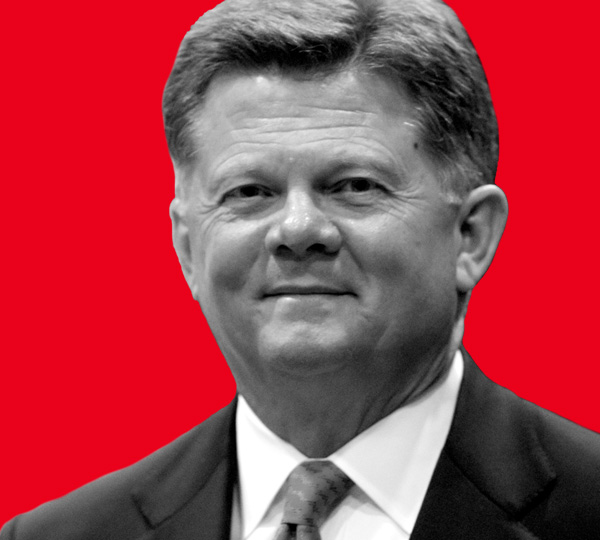CarMax founder supports Plan II study abroad and recalls his own experience
One spring day in 1973, while wandering the streets of Lima, University of Texas student Austin Ligon got swept up in an Easter procession. There he was, a Protestant from West Texas, marching for hours with hundreds of thousands of Peruvian Catholics behind a statue of the Virgin Mary.
It was one of many moments during his study abroad experience when Ligon felt he had truly immersed himself in another world.
“Not only did I learn a language, I got these cultural experiences that opened my eyes in a way that nothing else could have,” Ligon recalls. “As a kid from West Texas, my eyes needed to be opened.”
Ligon, a 1973 Plan II alumnus who went on to found CarMax, believes that every experience matters and that study abroad should not be seen as a luxury, but an important component in a college student’s education.
That’s why Ligon and his wife Samornmitr “Pan” Lamsam donated $1 million to Plan II in 2006 with instructions that the money be spent over the next five years on study abroad programs. They made an additional four-year pledge of $200,000 this year and encouraged other alumni to support the program.
Ligon’s generosity earned him the Pro Bene Meritis award — the highest honor bestowed by the College of Liberal Arts — and the gratitude of more than 500 Plan II students who have benefited from the fund.
“Austin is not simply a wonderful donor, but a wonderful person — whip smart, endlessly curious, always interested in students and frankly very funny,” says Plan II Director Michael Stoff. “He wants to do good and does, but he also is good, with a heart and a head in the right place. He is a man of vision, not just a businessman of vision.”
Ligon’s vision is particularly important now, Stoff says.
“In the 21st century, as the globe shrinks, all students, indeed all Americans, must become citizens of the world in addition to being citizens of their country,” he says. “I know of few other ways people can immerse themselves in foreign cultures and thus in the world at large than to live and study abroad.”
In the 1950s and 60s, Ligon’s world consisted of Midland and the vast stretches of West Texas prairie and desert surrounding it. As a boy, he would accompany his father on long, pre-dawn drives to deliver drill bits to remote oil rigs. His dad and maternal grandfather, an oil driller who “could stare a rattlesnake back into his hole,” modeled hard, honest work and an adventurous spirit.
His mother and grandmother instilled in him Quaker values, one of which directly influenced the innovative car sales business he co-founded. Quakers opposed haggling because it was considered sinful for a merchant to lie about a product’s cost. Ligon’s company CarMax offered cars at fixed prices.
In high school, Ligon had Ivy League aspirations, and a college counselor pointed him to the intellectually rigorous Plan II program. In his application essay, Ligon wrote about being governor of the moon.
“They thought that was sufficiently ridiculous and that I’d fit right in,” he says with a laugh.
Plan II provided a stimulating — and at times intimidating — introduction to academic life for Ligon. He embraced being a student, roaming the library stacks and consuming new ideas. He opted for the Asian studies instead of the Western civilization branch, joined the Tejas Club — a men’s social and scholarly organization — and, despite having to hold down part-time jobs each semester, managed to finish all his required course work in three years.
It was the summer of 1972. With a low draft number, Ligon would almost certainly be sent to f ight in Vietnam. He had one more year of deferment, but didn’t want to just hang around campus for another year. So he cobbled together a study abroad proposal.
Until then, his only experience in a foreign country was eating lunch in a Mexican border town with his parents. Peru was the most exotic place he could imagine.
He moved in with a family — in an unfinished room on the third floor of an unfinished house — in a suburb of Lima, gained fluenc y in Spanish — a skill that would later land him an overseas consulting job — and dove into Peru’s eclectic blend of cultures.
“It was like a whole lifetime of experience,” says Ligon who has since lived and traveled extensively abroad.
Helping students achieve those experiences decades later, he says, has been particularly rewarding.
Many, he says, have carved out “really creative and inventive study plans that you’d expect a Plan II student to come up with.”
One student spent six months in Paraguay, Argentina and Brazil researching the Jesuit missionaries’ efforts to Christianize the indigenous people and protect them from Spanish and Portuguese slavers.
Ligon also praised Stoff for using the funds creatively and supporting innovative international travel opportunities, which he hopes can be used as a unique recruiting tool for the Plan II program.
“Study abroad just makes you a broader and more complete person, and I think it helps you in a thousand ways,” Ligon says. “It is the true purpose of a liberal arts education in the classic sense.”
